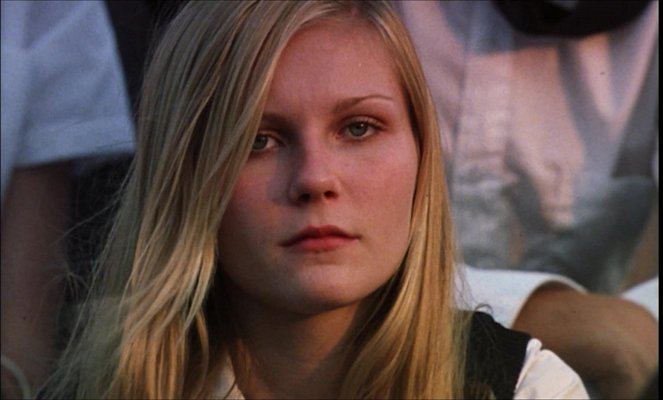Directed by:
Sofia CoppolaScreenplay:
Sofia CoppolaCinematography:
Edward LachmanComposer:
AirCast:
James Woods, Kathleen Turner, Kirsten Dunst, Josh Hartnett, Michael Paré, Scott Glenn, Danny DeVito, A.J. Cook, Hanna Hall, Chelse Swain, Leslie Hayman (more)Plots(1)
A group of neighbourhood boys become obsessed with five beautiful sisters that remain under the close guard of their parents. The suicide of the youngest sister is the catalyst to the girls inevitably tragic end. (Pathé Distribution UK)
Reviews (3)
There's no denying that Sofia has directorial talent and knows how to work with actors, who perform like a dream in each of her films. But somehow I just didn't get why the girls did it, I didn't understand the motivations behind their actions. I mean, I understood, but Sofia must have had an ultra liberal upbringing if she found an act as horrible as taking one’s own life adequate to the situation these girls were in. Because if everyone who has such "terrible" parents were to kill themselves, an entire generation would die, including a significant portion of FilmBooster users. :)
()
The Virgin Suicides is a story of girls told from the perspective of men. It is a very mature feature debut that violates multiple norms of standard Hollywood storytelling. The film de facto does not have a protagonist who would have to resolve conflicts and overcome obstacles in order to achieve a particular goal. As in the book on which the film is based, the narrator is an undefined representative of the male gender. We get only a minimum number of satisfactory answers to numerous questions, so a number of gaps remain unfilled until the end. At one point, Coppola even takes the liberty of using a false flashforward (escape by car). ___ Despite the breadth of the interpretative field, this is not vague new-age nonsense in which impressions take precedence over logic. The film is precise in its mediation and parallel shedding of the boyish/masculine perspective, thus putting at the centre of our attention the act of constructing and observing idealised images instead of the girls themselves, whom we are not allowed to get to know. The effort to understand the sisters (and their world, symbolised by the Lisbons’ home, a dollhouse in which they are locked up and that “dies” with them in the end), who began to exist for a group of boys only “thanks” to the suicide committed by one of them, is limited by adopted mental schemes and stereotypical pigeonholing. This involves a strongly generalising perception based on the assumption of peculiar female irrationality, which does not take into account the distinct nature of each of the girls, of whom only Lux gains a certain independence in the eyes of boys through her sexuality. Coppola distances herself from the simplistic understanding of complex human beings through the ironic use of expressive clichés from sillier “girl movies” (music, banal “illustrations” containing shots of picking flowers, a sunny landscape and unicorns that accompany the reading of Cecilia’s diary). ___ This story veiled in mythology (an indeterminate timeframe, bold symbolism, a timeless theme reminiscent of Picnic at Hanging Rock) about how a woman’s innocence (or the idea of innocence) deprives a man of his mental balance, the ability to be empathetic and to love thus also serves as an attack on the “appropriating” masculine perspective and patriarchal visualisation formulas. Wherever the novel allowed her to do so, Coppola expressed enough empathy for the girls to enable them to exclusively fulfil the role of mysterious and beautiful objects. Of no less importance, the inspiring and multi-layered The Virgin Suicides is a generational statement on the unwillingness to admit that “this tree is dead” (whether we substitute Cecilia, childhood or something else for the tree) and futile defiance by means of music, sex and suicide. 80%
()
That’s what a poetic film looks like, but I’m not sure if I like it.
()

